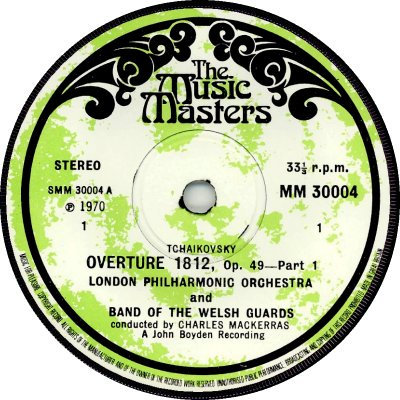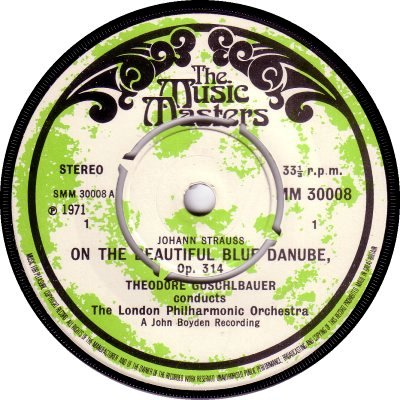

From the earliest days of the gramophone there has always been a demand for records of Classical music. Thanks to the limitations of the 78rpm format it initially tended to come in three-and-a-half minute chunks, with a symphony (for example) being spread over several sides. The birth of the LP in the 1950s meant that long pieces of music could be fitted on to one side of a record. Excerpts from popular Classics still appeared on 7" EPs and singles, but there was a dwindling market for them - most music-lovers preferred to hear the popular bits as part of the whole works, as the composers had intended. By the time the '70s came round, Classical 7"s were a rarity. The occasional one slipped out, usually as a result of some familiar piece being used on an advert or in a television programme, but they were few and far between. The Music Masters must have been one of the last labels to feature a series of Classics in that format: it dates from 1972. The series was a product of Music For Pleasure / EMI, who had a successful album-only Classical music label, Classics For Pleasure. According to trade paper 'Music Week' of the 19th of August 1972 twelve EPs had been test-marketed over the previous six months in selected locations and had been well received. Accordingly a batch of twenty were to released, all on the same date - the 29th of September. Later editions of 'Music Week, however, hinted at problems. On the 26th of August there was a report that MFP were having difficulty getting product pressed, thanks to a combination of holidays and troubles following the EMI pressing plant's move to a new location. Then on the 7th of October came news that EMI's manufacturing troubles had led to the cancellation of MFP's September supplement - the one which included the 'The Music Masters' series. Thus it may well be that the twelve records which were test-marketed were the only ones that ever made it to the shops. Googling reveals no trace at all of six numbers out of the twenty, and several of the others were hard to track down. Indeed, for a product of a major company the records are generally uncommon. A test-marketing followed by the forced cancellation of the actual issue would be a reasonable explanation both for their scarcity and for the missing numbers. 'Billboard' of the 2nd of September offered some details of the test marketing: it was carried out in 200 specially chosen outlets in the north, Midlands, Kent, Surrey and Central London areas, with 50 accounts in each area, and the outlets included bookshops, photographers and chemists as well as the more obvious department stores, record shops and so on. The reaction of CFP's sales manager George White in the article was enthusiastic: "The results astonished us and we decided to go ahead with the project," he is quoted as saying. He went on to add that there had been an even pattern of sales across the 12 preliminary discs chosen for the experiment, with a major emphasis on impulse buying. The article noted that the material on the EPs was taken from CFP / MFP's existing repertoire; it also gave a truncated listing of the works that were to feature on the records, which shows that Schumann's 'B Minor Canon' and 'Claire De Lune' by Debussy were among the EPs that are unaccounted for. Numbering was in an MM-30000 series, though 30007 had an 'S' put in front of its prefix. Picture covers were the norm. The label design stayed the same throughout; perforating the records so that the centres could be pushed out tended to obscure the credits somewhat (2). The tracks - or a selection from them, with others added - were later issued on three LPs on EMI's budget-price 'Sounds Superb' label, 'The Music Masters, Vol.1' (SPR-90029), 'Vol.2' (SPR-90049; 1975), and 'Vol.3' (SPR-90068). At least two of the EPs were licensed to ICI and came out on that company's label (q.v.): SMM-30017 appears to be a later version of IC-3, while IC-4 seems to be a reissue of MM-30007 - the later issues have the earlier ones' matrix numbers in their run-offs. The discography below includes the few records that I have been able to verify. If anybody can provide details of MM-30010 or confirm the existence of MMs 30003, 30012, 30013, 30014, 30016, or 30018, I'd be interested to hear from them.



Copyright 2006 Robert Lyons.

